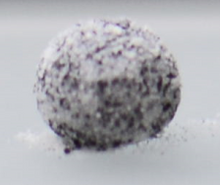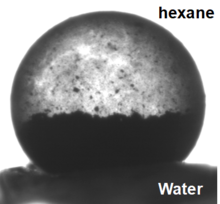
Liquid marbles are non-stick droplets (normally aqueous) wrapped by micro- or nano-metrically scaled hydrophobic, colloidal particles (Teflon, polyethylene, lycopodium powder, carbon black, etc.); representing a platform for a diversity of chemical and biological applications. Liquid marbles are also found naturally; aphids convert honeydew droplets into marbles. A variety of non-organic and organic liquids may be converted into liquid marbles. Liquid marbles demonstrate elastic properties and do not coalesce when bounced or pressed lightly. Liquid marbles demonstrate a potential as micro-reactors, micro-containers for growing micro-organisms and cells, micro-fluidics devices, and have even been used in unconventional computing. Liquid marbles remain stable on solid and liquid surfaces. Statics and dynamics of rolling and bouncing of liquid marbles were reported. Liquid marbles coated with poly-disperse and mono-disperse particles have been reported. Liquid marbles are not hermetically coated by solid particles but connected to the gaseous phase. Kinetics of the evaporation of liquid marbles has been investigated.
Interfacial water marbles
Liquid marbles were first reported by P. Aussillous and D. Quere in 2001, who described a new method to construct portable water droplets in the atmospheric environment with hydrophobic coating on their surface to prevent the contact between water and the solid ground (Figure 1). Liquid marbles provide a new approach to transport liquid mass on the solid surface, which sufficiently transform the inconvenient glass containers into flexible, user-specified hydrophobic coating composed of powders of hydrophobic materials. Since then, the applications of liquid marbles in no-loss mass transport, microfluidics and microreactors have been extensively investigated. However, liquid marbles only reflect the water behavior at the solid-air interface, while there is no report on the water behavior at the liquid-liquid interface, as a result of the so-called coalescence cascade phenomenon.

When a water droplet is in contact with a water reservoir, it will quickly pinch off from the reservoir and form a smaller daughter droplet, while this daughter droplet will continue to go through a similar contact-pinch off-splitting process until completed coalescence into the reservoir, the combination or summary of these self-similar coalescence processes is called coalescence cascade. The underlying mechanism of coalescence cascade has been studied in detail but there has been mere attempt to control and make use of it. Until recently, Liu et al. has filled this void by proposing a new method to control coalescence cascade by using nanostructured coating at the liquid-liquid interface, —the interfacial liquid marbles.

Similar to liquid marbles at the solid-air interface, the interfacial liquid marbles are constructed on the hexane/water interface using water droplets with a surface coating composed of nanoscale materials with special wettability (Figure 2). To realize interfacial water marbles at hexane/water interface, the individual particle size of the surface coating layer should be as small as possible, so that the contact line between the particles and the water reservoir can be minimized; special wettability with mixed hydrophobicity and hydrophilicity is also preferred for the interfacial water marble formation. The interfacial water marble can be fabricated by firstly coating a water droplet with nanomaterials with special wettability, e.g. hybrid carbon nanowires, graphene oxide. Afterwards a secondary coating layer of polyvinylidene fluoride (PVDF) is applied onto the coated water droplet. The doubly-coated water droplet is then cast into the hexane/water mixture and eventually settled at the hexane/water interface to form the interfacial water marble. During this process, the PVDF coating quickly diffused into hexane to balance the hydrophobic interaction between hexane and the water droplet, while the nanomaterials quickly self-assembled into a nanostructured protective layer on the droplet surface through the Marangoni effect.
The interfacial water marble can completely resist coalescence cascade and exist nearly permanently at the hexane/water interface, providing that the hexane phase is not depleted by vaporization. The interfacial water marbles can also realize a series of stimuli-responsive motions by integrating the functional materials into the surface coating layer. Due to their uniqueness in both form and behavior, the interfacial water marbles are speculated to have remarkable applications in microfluidics, microreactors and mass-transport.
See also
- Pickering emulsion
- Spherification (culinary process)
References
- ^ Aussillous, Pascale; Quéré, David (2001). "Liquid marbles". Nature. 411 (6840): 924–7. Bibcode:2001Natur.411..924A. doi:10.1038/35082026. PMID 11418851. S2CID 4405537.
- Quéré, David; Aussillous, Pascale (2006). "Properties of liquid marbles". Proceedings of the Royal Society A: Mathematical, Physical and Engineering Sciences. 462 (2067): 973. Bibcode:2006RSPSA.462..973A. doi:10.1098/rspa.2005.1581. S2CID 136039083.
- ^ McHale, G; Newton, M. I (2015). "Liquid marbles: Topical context within soft matter and recent progress". Soft Matter. 11 (13): 2530–46. Bibcode:2015SMat...11.2530M. doi:10.1039/C5SM00084J. PMID 25723648.
- Pike, N; Richard, D; Foster, W; Mahadevan, L (2002). "How aphids lose their marbles". Proceedings of the Royal Society B: Biological Sciences. 269 (1497): 1211–5. doi:10.1098/rspb.2002.1999. PMC 1691028. PMID 12065036.
- ^ Bormashenko, Edward; Bormashenko, Yelena; Grynyov, Roman; Aharoni, Hadas; Whyman, Gene; Binks, Bernard P (2015). "Self-Propulsion of Liquid Marbles: Leidenfrost-like Levitation Driven by Marangoni Flow". The Journal of Physical Chemistry C. 119 (18): 9910. arXiv:1502.04292. Bibcode:2015arXiv150204292B. doi:10.1021/acs.jpcc.5b01307. S2CID 95427957.
- ^ Bormashenko, Edward (2016). "Liquid Marbles, Elastic Nonstick Droplets: From Minireactors to Self-Propulsion". Langmuir. 33 (3): 663–669. doi:10.1021/acs.langmuir.6b03231. PMID 28114756.
- Draper, Thomas C.; Fullarton, Claire; Phillips, Neil; Costello, Ben P.J. de Lacy; Adamatzky, Andrew (2017). "Liquid marble interaction gate for collision-based computing". Materials Today. 20 (10): 561–568. arXiv:1708.04807. Bibcode:2017arXiv170804807D. doi:10.1016/j.mattod.2017.09.004. S2CID 25550718.
- Wong, Cl.Y. H. M. Adda-Bedia M., Vella, D. (2017). "Non-wetting drops at liquid interfaces: from liquid marbles to Leidenfrost drops". Soft Matter. 13 (31): 5250–5260. arXiv:1706.03959. Bibcode:2017SMat...13.5250W. doi:10.1039/C7SM00990A. PMID 28644495. S2CID 32825677.
{{cite journal}}: CS1 maint: multiple names: authors list (link) - de Gennes, Pierre-Gilles; Brochard-Wyart, Françoise; Quéré, David (2004). Capillarity and Wetting Phenomena | SpringerLink. doi:10.1007/978-0-387-21656-0. ISBN 978-1-4419-1833-8.
- Supakar, T. (2017). "Impact dynamics of particle-coated droplets". Physical Review E. 95 (1): 013106. Bibcode:2017PhRvE..95a3106S. doi:10.1103/physreve.95.013106. PMID 28208334.
- Li, Xiaoguang(李晓光 ); Wang, Yiqi(王义琪 ); Huang, Junchao(黄俊超 ); Yang, Yao(杨瑶 ); Wang, Renxian(王仁贤 ); Geng, Xingguo(耿兴国 ); Zang, Duyang(臧渡洋 ) (2017-12-25). "Monolayer nanoparticle-covered liquid marbles derived from a sol-gel coating". Applied Physics Letters. 111 (26): 261604. Bibcode:2017ApPhL.111z1604L. doi:10.1063/1.5010725. ISSN 0003-6951.
- Fullarton, Claire; Draper, Thomas C.; Phillips, Neil; Mayne, Richard; Costello, Ben P. J. de Lacy; Adamatzky, Andrew (2018-02-06). "Evaporation, Lifetime, and Robustness Studies of Liquid Marbles for Collision-Based Computing" (PDF). Langmuir. 34 (7): 2573–2580. doi:10.1021/acs.langmuir.7b04196. PMID 29359941.
- Ooi, Chin Hong; Bormashenko, Edward; Nguyen, Anh V.; Evans, Geoffrey M.; Dao, Dzung V.; Nguyen, Nam-Trung (2016-06-21). "Evaporation of Ethanol–Water Binary Mixture Sessile Liquid Marbles". Langmuir. 32 (24): 6097–6104. doi:10.1021/acs.langmuir.6b01272. hdl:10072/142813. ISSN 0743-7463. PMID 27230102.
- Dandan, Merve; Erbil, H. Yildirim (2009-07-21). "Evaporation Rate of Graphite Liquid Marbles: Comparison with Water Droplets". Langmuir. 25 (14): 8362–8367. doi:10.1021/la900729d. ISSN 0743-7463. PMID 19499944.
- Karokine, Nikita; Anyfantakis, Manos; Morel, Mathieu; Rudiuk, Sergii; Bickel, Thomas; Baigl, Damien (5 September 2016). "Light-driven transport of a liquid marble with and against surface flows" (PDF). Angewandte Chemie International Edition. 55 (37): 11183–11187. doi:10.1002/anie.201603639. PMID 27381297.
- Zhao, Yan; Fang, Jian; Wang, Hongxia; Wang, Xungai; Lin, Tong (9 February 2010). "Magnetic liquid marbles: manipulation of liquid droplets using highly hydrophobic Fe3O4 nanoparticles". Advanced Materials. 22 (6): 707–710. Bibcode:2010AdM....22..707Z. doi:10.1002/adma.200902512. PMID 20217774. S2CID 205234566.
- Arbatan, Tina; Li, Lizi; Tian, Junfei; Shen, Wei (11 January 2012). "Liquid marbles as micro-bioreactors for rapid blood typing". Advanced Healthcare Materials. 1 (1): 80–83. doi:10.1002/adhm.201100016. PMID 23184689.
- Sarvi, Fatemeh; Jain, Kanika; Arbatan, Tina; Verma, Paul J.; Hourigan, Kerry; Thompson, Mark C.; Shen, Wei; Chan, Peggy P.Y. (7 January 2015). "Cardiogenesis of embryonic stem cells with liquid marble micro-bioreactor". Advanced Healthcare Materials. 4 (1): 77–86. doi:10.1002/adhm.201400138. PMID 24818841. S2CID 27631842.
- Blanchette, François; Bigioni, Terry P. (1 April 2006). "Partial coalescence of drops at liquid interfaces". Nature Physics. 2 (4): 254–257. Bibcode:2006NatPh...2..254B. doi:10.1038/nphys268.
- Thoroddsen, S. T.; Takehara, K. (June 2000). "The coalescence cascade of a drop". Physics of Fluids. 12 (6): 1265–1267. Bibcode:2000PhFl...12.1265T. doi:10.1063/1.870380. hdl:2142/112637.
- Klyuzhin, Ivan S.; Lenna, Federico; Roeder, Brandon; Wexler, Adam; Pollack, Gerald H (11 November 2010). "Persisting water droplets on water surfaces". Journal of Physical Chemistry B. 114 (44): 14020–14027. doi:10.1021/jp106899k. PMC 3208511. PMID 20961076.
- Geri, Michela; Keshavarz, Bavand; McKinley, Gareth H.; Bush, John W. M. (25 December 2017). "Thermal delay of drop coalescence". Journal of Fluid Mechanics. 833: R3. Bibcode:2017JFM...833R...3G. doi:10.1017/jfm.2017.686. hdl:1721.1/112194.
- Liu, Yang; Zhang, Xinyu; Poyraz, Selcuk; Zhang, Chao; Xin, John (15 March 2018). "One-step synthesis of multifunctional zinc-iron-oxide hybrid carbon nanowires by chemical fusion for supercapacitors and interfacial water marbles". ChemNanoMat. 4 (6): 546–556. doi:10.1002/cnma.201800075. hdl:10397/78424.